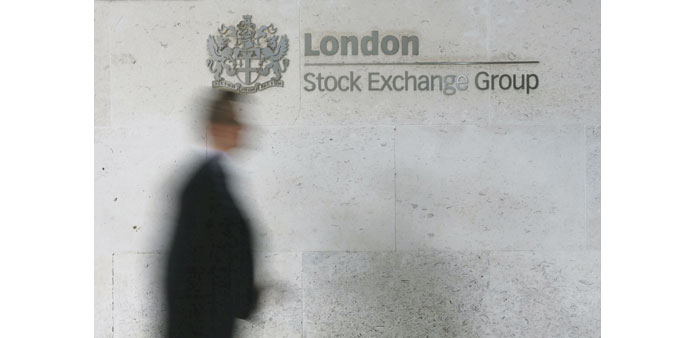A man walks past the London Stock Exchange in the City of London. The benchmark FTSE 100 index yesterday finished the day down 0.5%.
AFP
London
European stocks pulled back yesterday, with London penalised as sliding metals and oil prices hurt heavyweight mining and energy companies.
Eurozone indices were down also despite fairly positive regional data.
Meanwhile growing confidence that the US will raise interest rates next month boosted the dollar, in turn hurting the euro which struck a seven-month low also on speculation of more stimuli from the European Central Bank (ECB).
“After a very positive stretch for equity markets last week, a sharp fall in commodity prices has sent the UK market lower,” said Rebecca O’Keeffe, head of investment at stockbroker Interactive Investor.
“With oil and industrial metals prices all sharply down on fears of oversupply, reduced demand and a strengthening US dollar, the commodity-heavy FTSE 100 has nowhere to hide.”
The EURO STOXX 50 was Down 0.2% at 3,446.27.
London’s benchmark FTSE 100 index finished the day down 0.5%, Frankfurt shed 0.3% and Paris gave up 0.4%.
It came as New York oil prices traded around the $42-a-barrel level. Nickel continued to plunge and gold declined—helping push Bloomberg’s Commodity Index to a 16-year low.
The declines weighed on mining and energy majors, with shares in miner Antofagasta dropping 2.3%, commodities giant Glencore falling 2.0% and Royal Dutch Shell’s A share losing 0.5%.
Traders in Europe were reacting also to news that eurozone business activity hit a four-and-a-half year high in November, helping create much-needed jobs in a broad-based upturn despite the impact on France of the Paris attacks.
Data monitoring company Markit said its closely watched Composite Purchasing Managers Index rose to 54.4 points from 53.9 points in October, putting it well above the 50-point boom-or-bust line.
“While the ECB will undoubtedly take some encouragement and comfort from the improved eurozone purchasing managers’ surveys for November, they will unlikely deter the bank from delivering more stimulus in December especially as prices charged continued to fall,” said Howard Archer, chief economist on Europe at research group IHS Economics.
Craig Erlam, senior analyst at Oanda, said the PMI data “points to slightly stronger growth in the fourth quarter” but added “I don’t think it will dissuade the ECB from easing monetary policy at the meeting next month.”
The euro stood at $1.0604 in late European trading, up from a seven-month low of $1.0601 struck during Asian trading hours on Monday.
For Erlam, the PMI data “failed to ease the pressure” on the single currency.
European Central Bank chief Mario Draghi had on Friday hinted the lender could unleash further stimulus to boost stubbornly low inflation in the eurozone, comments which helped to drag the single currency to its lowest point since mid-April.
The focus on Wall Street was on US-based Pfizer and Ireland-based Allergan after they said they will merge to create the world’s biggest pharmaceutical group in a deal worth about $160bn.
Pfizer fell 2.7% to $31.32 on the news, saying it would move its headquarters to low-tax Ireland, throwing down a challenge to the US government’s crackdown on corporate tax inversions. US-traded Allergan shares dropped 2.6% to $304.28.

